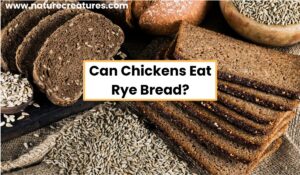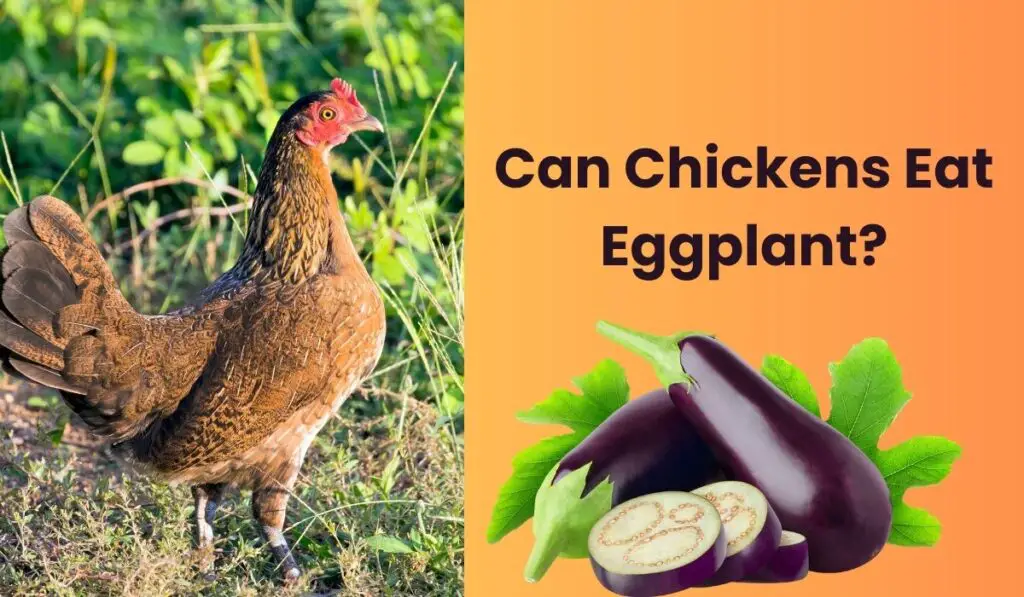
Purple fruit eggplant is commonly referred to as a vegetable, despite its true nature as a fruit. I cultivate this plant and other fruits and vegetables in my lovely small garden. The flesh has a spongy texture, and it is white in color. The real question, though, is whether chickens can eat eggplant.
Indeed, chickens are curious about eating this fruit just like humans are. Because of its neutrality, this food is suitable for chickens. The nightshade family, however, also includes tomatoes and eggplant. Don’t use the plant’s green components, such as the stems and leaves. Your flock is in danger because all of these components contain solanine. On the other hand, the remaining portions of the fruit are secure. It has a lot of healthy nutrients, vitamins, and minerals that are good for the well-being of your chicken.
Is Eggplant Safe for Chickens?
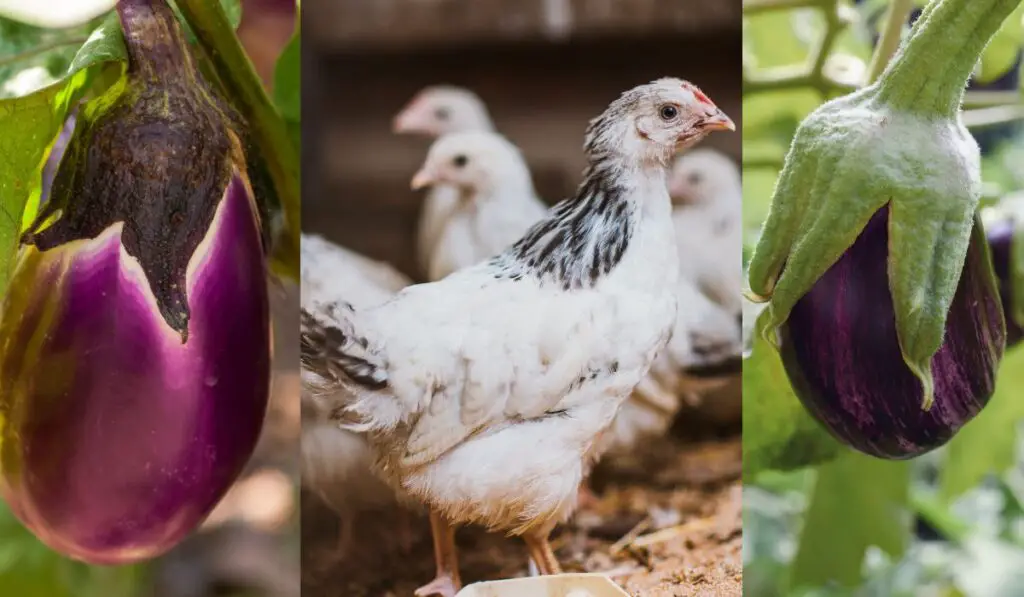
Using this garden egg with chicken is a good and healthy treat for your flock. Beneficial nutrients like folic acid, fiber, and antioxidants are abundant in eggplants. Additionally, it includes magnesium, phosphorus, copper, vitamin B6, vitamin C, and vitamin B6. Therefore, all of these factors contribute to the growth and improvement of your feathered friends. However, your chickens need to stay away from the green parts of this plant because they are unhealthy for your hens.
13 Advantages to Feeding Eggplant to Your Chickens
Here are a few nutritional advantages eggplants can offer your chickens.
Antioxidants
They help to safeguard the cell membrane. For the benefit of your flock, it helps to prevent neuronal inflammation. Additionally, it strengthens the immune system.
Insufficient antioxidant intake will cause your chickens to become ill and unhealthy, and they won’t be able to produce as many eggs.
Folic acid
Folic acid should make up a significant portion of your chickens’ diet. Therefore, eggplant is a good source of folic acid for your hens. It is crucial for chickens’ egg production. Additionally, it improves your hens’ reproductive systems.
Phosphorus
Phosphorus is another beneficial element for your hens. This mineral is necessary for the ability of your feathered friends to lay eggs. Additionally, it is crucial for the disintegration of calcium.
Vitamin C
This vitamin must boost the immune systems of chickens. The chicken gains from this because it continues to be active and healthy. They help to heal the wounds of your furry friends. Remember to provide healthy cartilage for your chicken.
Potassium
Potassium is a crucial nutrient for the growth of muscles. It helps keep your chicken hydrated as well. Your chickens can benefit from this element by staying hydrated, especially in the hot summer. This assistance will make your chicken feel comfortable. Additionally, it supports the nerve signals of your flock and is essential for complete balancing.
Vitamin K
Your chicken’s bones will mineralize appropriately with vitamin K. Your chickens will suffer from poor blood coagulation if they don’t get enough of this nutrient.
Vitamin B6
Keeping the chicken’s appetite healthy is aided by vitamin B6. Your fowl friends might have developed anemia if you hadn’t given them the proper dosage of this element. In addition, it eases nervousness and skeletal conditions.
Fiber
Chickens require ten grams of fiber every day. Because of this, eggplant has a lot of fiber, which is excellent for keeping your chicken full. It also supports the regularity of the digestive tract. It enhances the chickens’ ability to digest food. Furthermore, it lessens the packing of feathers.
Thiamine
Thanks to eggplant, which gives your chicken thiamine, chickens can maintain their metabolism. Additionally, it supports the growth and health of hens. A thiamine deficiency can impact a chicken’s body temperature and respiratory rate. It aids in the maintenance of neurovascular diseases as well. To improve the health of your flock mates, you must provide them with this nutrient.
Niacin
It is crucial for chickens with neurological disorders. Additionally, it aids in the bone development of your feathered friends. The main advantage of this nutrient is that it contributes significantly to converting other nutrients into usable energy.
Copper
Copper facilitates the improvement of chicken growth. It helps chickens grow faster so they can produce more meat. Copper also lowers the cholesterol level in your chickens, which is another benefit. As a result, it is excellent for the growth of hens. So be sure to include this nutrient in the diets of your poultry friends.
Manganese
The improvement of your hens’ growth depends on the use of manganese. It supports the hens’ bone growth. The quality of the chickens’ shells depends on it. As a result, you give your chicken enough manganese to ensure its continued good health.
Magnesium
If you grow broilers, you should know that this mineral is a very energizing food for them. It is crucial for the growth of chicken muscles. Additionally, it promotes the flock’s cardiovascular health.
How Do You Feed Eggplant to Chickens?
As a poultry owner, you should need that eggplant must be thoroughly prepared. Although brinjals are delicious and nutritious, some of their parts are harmful. The stems and leaves are examples of these components. As a result, you should remove these sections before distributing them to your flock. The following is a whole discussion of the Brinjal feeding approaches. It is totally up to you which technique you desire to implement for your fowl companions. However, I will explain both of these approaches to you.
Raw
First, wash and scrub the eggplants to remove any pesticides. This process ensures that it is safe to eat and contains no chemicals. It is currently breakable into smaller pieces. If you’re a poultry owner, cut the brinjal into cubes. After cutting, these pieces then spread across the grass.
Additionally, you can turn it upward so your chicken can eat and capture it. To allow the chicken to chew the skin, you might alternatively hang it. As a result, your chicken can love to eat it and enjoy doing so in all of these ways.
Cooked
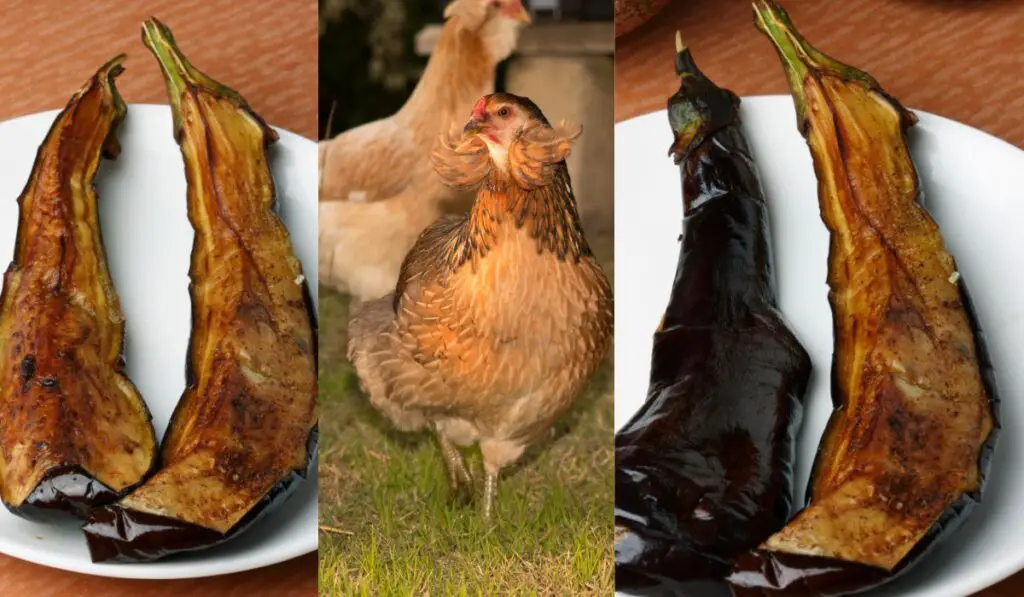
Another approach to preparing meals for chickens using eggplants is to feed them. You can cook it with steam. You can boil brinjal to get rid of its bitter flavor. You shouldn’t include a salty taste. Some eggplant seasonings have the potential to hurt your chicken. You can also fry it, but I didn’t recommend it because frying causes the food to lose nutrients. Therefore, the ideal method is to feed your flock steamed and raw eggplants. Although the flesh, skin, and seeds are simple for your chicken to eat.
Which Eggplant Species Is Poisonous to Chickens?
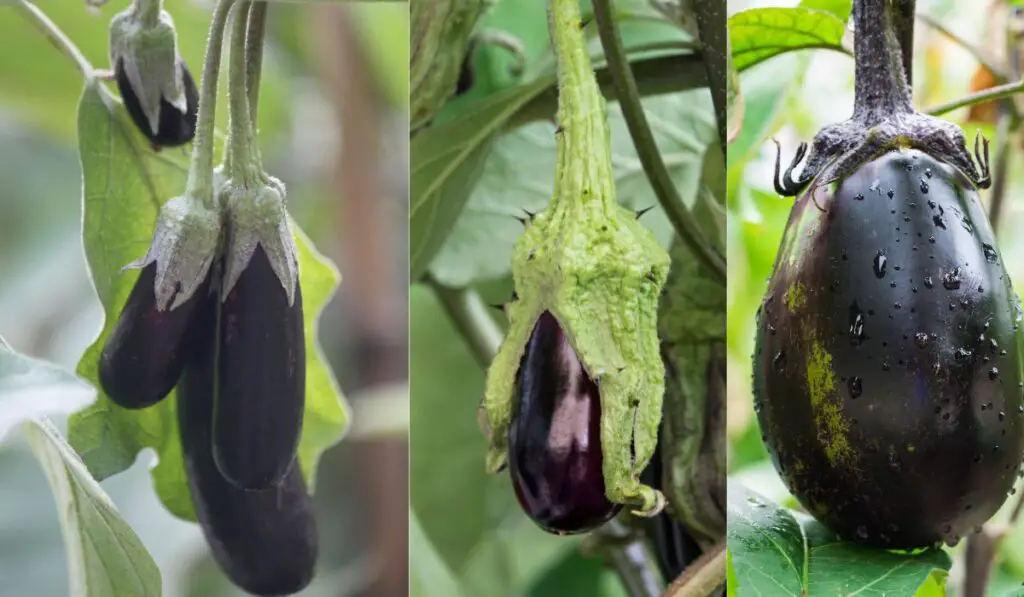
Due to its nightshade family ancestry, eggplant contains solanine, a poison harmful to humans and chickens. The green portion of the Brinjal shouldn’t be fed to hens since it has solanine. The calyx, stalks, and leaves are some examples of these components. When consumed in sufficient amounts by chickens, these portions cause a searing and blazing reaction in the throat. These illnesses, including nausea, vomiting, and irregular heartbeat, can also be brought on by too much solanine and can even be fatal. For this reason, I’ll advise you to cut off the green sections and leaves from the eggplant’s tip.
Why Is Solanine Harmful to Chickens?
A glycoalkaloid called solanine is present in species of the nightshade family, including green potatoes, tomatoes, and eggplant. It is lethal to people and hens alike. Its poisonous qualities serve as a natural barrier for the plant. Solanine causes neurological and gastrointestinal problems when consumed. Among these toxic components are the leaves, calyx, and stems. The chicken will have the following issue if it consumes too much food:
Lethargy
The energy level of the chickens will inevitably drop. They’ll experience fatigue and weakness. It is good to consult a veterinarian for treatment or advice.
Drooling is excessive
Drooling is not something that hens do; if they do, something is wrong with their bodies. Chickens who consume a lot of solanine may drool excessively. When this happens to your chickens, take them to the doctor for additional testing.
Diarrhea
Difficulties with the digestive system are brought on by solanine, leading to diarrhea.
Reduced Appetite
After consuming a lot of solanine, the chicken would eat less. When in doubt about how to save your chickens, it is preferable to see a veterinarian. Adult hens can go eight hours without food or water, compared to young chicks’ six-hour limit.
Trouble breathing
Solanine is painful for your chicken and results in difficult respiration.
Death
Your chicken may die if it consumes too much solanine, which is lethal.
How Much Eggplant Does It Take To Feed a Chicken?
The percentage of eggplants in the chickens’ diet must not exceed 10%. Chickens eat more nutritiously when they forage for food on the ground. When you give them too much eggplant, they become too full to look for other food. Weight loss will occur in chickens if they don’t get enough nutrients.
Can Chickens Eat the Seeds of Eggplant?
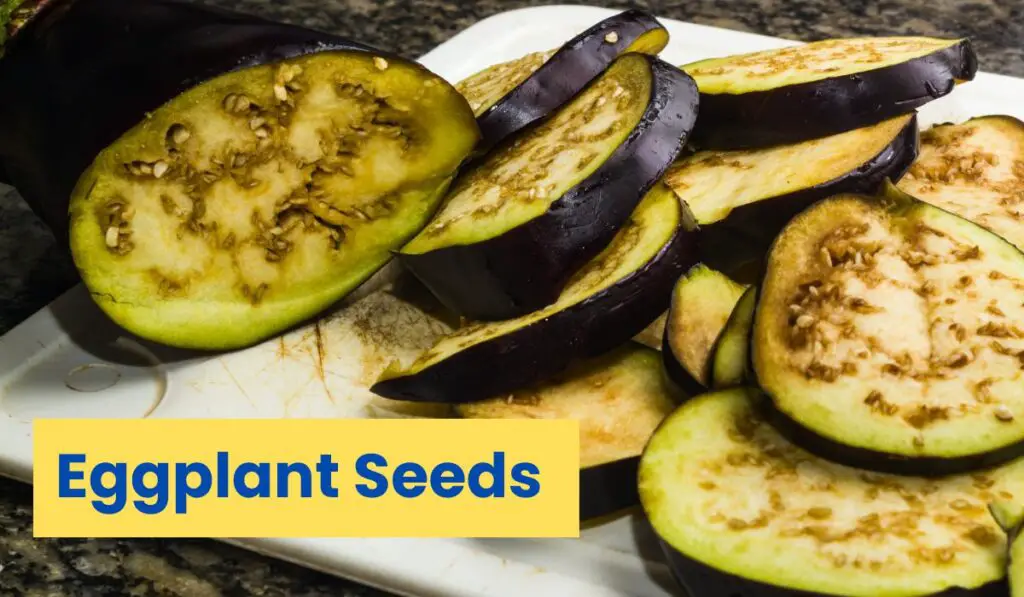
Chickens can consume eggplant seeds because they are both safe and tasty for them to eat. The bitter taste of the seeds indicates that they have been sitting for a very long time if they are dark in color. Sometimes it is necessary to discard darker seeds due to the possibility of spoilage.
Can Chickens Eat the Skin of Eggplant?
Chickens can consume the skin of the eggplant. The calyx, leaves, and other green parts of the eggplant are the only parts that can poison chickens. That is so because eggplants are a member of the Salicaceae plant family. The eggplant’s skin can be safely consumed and is edible.
Nasunin, an antioxidant, is abundant in the skin of eggplants. These antioxidants shield the cell membrane, stop neuroinflammation, and improve blood flow.
Can I Keep My Chicken in My Eggplant Garden?
Yes, if you let your chickens roam freely. They probably wouldn’t enjoy the leaves, but if you’re genuinely concerned, you should grow the plant in a problematic location for them to access or fence it off. Our hens do not like tomatoes or eggplants, even though tomatoes and eggplants are nightshade plants. They might devour the leaves if you let them wander around your eggplant garden. The leaves can hurt your chickens because they are poisonous. You can keep the chickens in your eggplant garden if they are restricted. Just make sure they can’t get to the leaves or stems.
Last Thoughts
Eggplants are a healthy food source for chickens, and you may feed them without preparing their meals. Refrain from overfeeding your hens to maintain a healthy diet. It is crucial to prepare eggplants appropriately despite their health benefits. Because the stem and leaves are harmful, don’t serve them with the chicken. Therefore, despite what you may have heard, it is a nutritious treat to offer to hens. The harmful components, such as the stems, leaves, and calyx, should be removed before feeding the plants to the gullible hens. They would like to pick the chilly flesh if it were warmer outside.
FAQs:-
Can chickens consume eggplant peels?
Without a doubt, yeah! Peels from eggplants are wholesome and nutrient-rich. To avoid food poisoning, remove the green sections.
Is it toxic for chickens to eat raw eggplant?
Raw eggplant doesn’t make chickens sick. However, chickens could become toxic if they eat any of their leaves, stems, or calyx. Solanine, an alkaloid found in certain eggplant sections, has the potential to be poisonous. Solanine can be lethal in big doses. Wash the eggplant and cut off the greens to prevent chicken food poisoning.
Is it safe to feed cooked eggplant to chickens?
Cooked eggplant is fine for chicken as it is not highly salted or blended with spices and seasonings. Seasoning might be harmful to your chicken. To reduce the bitterness of the cooked eggplant, steam it before serving. Avoid cooking the eggplant since it absorbs much oil and minimizes the nutrition.

